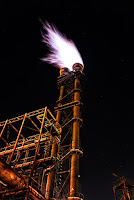Shale Gas Moratorium in Germany - Wintershall abandons research in North-Rhine Westphalia
 In the wake of the Brexit referendum and the European Football
Championship, the German parliament resolved a ban on shale gas
extraction by early summer 2016. The ban went into force in February
2017. Now a first, controversial, decision in the German federal state of
North-Rhine Westphalia not to prolong an existing authorization of the company Wintershall is the first regulatory decision,
based on the ban.
In the wake of the Brexit referendum and the European Football
Championship, the German parliament resolved a ban on shale gas
extraction by early summer 2016. The ban went into force in February
2017. Now a first, controversial, decision in the German federal state of
North-Rhine Westphalia not to prolong an existing authorization of the company Wintershall is the first regulatory decision,
based on the ban.
The German company Wintershall is currently holding exploration permits in the North-Rhine Westphalian fields `Rheinland`and `Ruhr`, which stretch over almost 3900 square kilometres, according to the regional newspaper Hessisch-Niedersaechsische Allgemeine https://www.hna.de/kassel/erdgassuche-wintershall-gibt-7446022.html . Wintershall issued an application to prolonge these permits for further three years.
Wintershall intended to take rock samples at a depth of up to 300 meters, according to the company `with no deep wells or fracking` https://www.wintershall.com/press-media/press-releases/detail/open-ended-research-in-nrw-not-possible.html. Wintershall insists that this is possible under current legislation, but the regulator in charge, the Bezirksregierung Arnsberg, took a different view.
The regulator stresses that the legislative situation changed considerably, compared to the framework that was in place when the original permits had been issued. On 11 February 2017 the German shale gas ban went into force, according to which a necessary water permit cannot be issued for particular rock strata (including shale), if fracking is part of the company`s planned activities. The regulator argues that, although Wintershall in its application did not mention fracking and is, indeed, merely proposing to carry out research activities, the fields in question could, in the future, merely be exploited by the hydraulic fracturing technique. Since fracking is banned for the rock strata in question, already the exploratory permit cannot be issued, because it could never lead to legally sound exploitation, as for the issuance of a seperate production permit the non-use of fracking is a pre-requisite. In other words the regulator refused to issue the exploratory permit, for which the pre-consitions were met, because it thinks that a possible future, seperate, production permit cannot be issued legally https://www.bezreg-arnsberg.nrw.de/presse/2017/02/018_17_02_03/index.php.
Wintershall board member Martin Bachmann critizised the decision in a press release: “As far as unconventional resources in Germany are concerned, we want to carry out basic research. First of all, we want to find out what there is underground. In a country like Germany with scarce natural resources, we must ask ourselves what resources will be available to us in the future,” said Bachmann. As he explained, however, Wintershall does not intend to pursue its application to extend the permits for the “Rheinland” and “Ruhr” approved fields further https://www.wintershall.com/press-media/press-releases/detail/open-ended-research-in-nrw-not-possible.html
The most likely reason is that Wintershall has several other activities in the region and does not want to `spoil` its relationship with the regulator by taking legal action.



Comments
Post a Comment